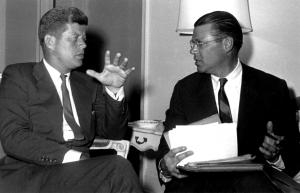NEWPORT, R.I., June 13 (UPI) — For the next two days, the Naval War College will host its annual Current Strategy Forum to discuss, explain and even to educate the public on maritime power and national security in a global environment.
Today, however, the Naval Postgraduate School in Monterrey, Calif., is conducting a seminar for its officer students who are seeking to become designated “strategists.” The school has been reckless enough to invite me, along with more distinguished speakers, to address this group of aspiring officers.
My message will not be kind.
To some degree, strategy is theological and metaphysical. While the great Gen. George Marshall could quip that if you got the objectives right, a lieutenant can write the strategy, the world is a bit more complex than that. Being a strategist is a notion about which I intend to disabuse the students. They may become many things, including future admirals and generals. But becoming a “strategist” is not one of them.
Instead, concentration should be on one of the most gigantic and dangerous gaps in the national security decision-making processes of the U.S. government. That is an absence of strategic thinking. Strategic thinking is far more important today for many reasons.
First, the era of grand strategy as envisaged by Clausewitz, the greatest of military philosophers and practiced by Bismarck, Disraeli, Churchill, Franklin Roosevelt and Richard Nixon belongs to the past. After the Soviet Union imploded, 20th century bipolarity of an “us against them mentality” — whether allies versus central or axis powers in two world wars or east versus west conflicts that dominated geopolitics — has ended. Since then, a succession of White Houses has promulgated so-called strategies too often based on aspirations, good intentions and even wishes for national security as incomplete surrogates for real strategies.
After the attacks of Sept. 11, George W. Bush had an epiphany about what to do next. Through his freedom agenda, he honestly believed that democratization would change the geostrategic landscape of the Middle East beginning in Iraq. He was correct. The outcome, however, was not what he expected.
Barack Obama entered office promising to end two wars. He did neither. Wars are ended through winning, losing or declaring a truce. Further, when the junior varsity turned out to be more substantial, the president set the aims as disrupting and destroying the Islamic State (aka Daesh).
Here, there were also only three outcomes: doing the job largely by ourselves, meaning deploying hundreds of thousands of troops indefinitely to Iraq and Syria or elsewhere, which surely has not worked; getting other people — namely Arabs and Muslims — to take on that task, which will not happen; or hope that IS will implode of its own weight and to the pinprick attacks by a combination of manned aircraft and drones.
How do you draft a strategy then worthy of the name?
You don’t. As a result, “strategy” has deteriorated into a sales and marketing document. The Navy needs so many ships; the Army and Marines a certain level of forces; the Air Force aircraft. Strategy tries to argue why. This is not new. The hundredth anniversary of Robert Strange McNamara’s birth last week makes this point.
During his long reign as defense secretary, U.S. strategy was to deter the Soviet Union. We did so through what McNamara termed “assured destruction” — the ability to deliver enough thermonuclear explosives to kill about 1/3 of the Soviet population and destroy about 1/2 of its industry. But the assured destruction curves were not the product of rigorous analysis. Instead, McNamara wanted to contain U.S. nuclear forces to 1000 ICBMs, 41 Polaris submarines and about 650 bombers. His graphs were drawn accordingly.
Instead of strategists, strategic thinkers are needed who are prepared to challenge rigorously and ruthlessly the assumptions underlying policies and aims set by higher authority. This requires comprehensive and objective knowledge and understanding of all aspects of the issues; a mindset reflecting the 21st century and not the binary nature of 20th-century thinking; and a laser-like focus on setting and then obtaining achievable outcomes.
Unless or until strategic thinking is embedded in our thought processes, strategy will become the means for selling and not achieving declared aims and objectives. And unless or until strategic thinking becomes ingrained, the tragedies of the past 15 years will not alleviate our propensity to fail to engage our brains.
Harlan Ullman is UPI’s Arnaud de Borchgrave Distinguished Columnist and serves as senior adviser for Supreme Allied Commander Europe, at the Atlantic Council and at Business Executives for National Security and chairs two private companies. His last book is “A Handful of Bullets: How the Murder of Archduke Franz Ferdinand Still Menaces the Peace.” His next book due out next year is “Anatomy of Failure: Why America Loses Wars It Starts.”

COMMENTS
Please let us know if you're having issues with commenting.